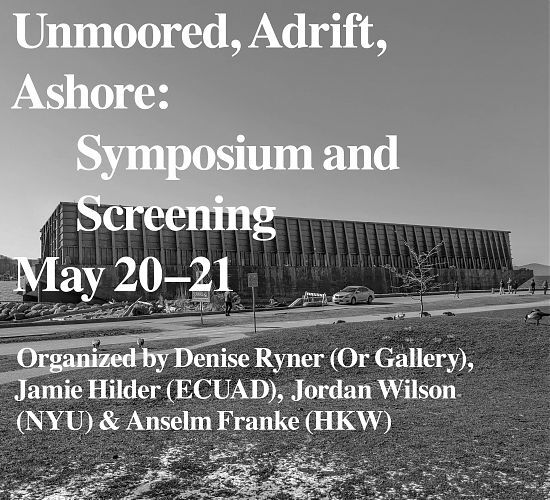Unmoored, Adrift, Ashore
The symposium will foreground examinations emerging from Indigenous and post-colonial thought that offer conceptions of water as a central component for decolonizing and disrupting conventional understandings of identity, borders, and ownership.
Location
On Campus
Reliance Theatre, Emily Carr University
Online Attendance
Register for online viewing and participation if unable to attend in person
Open to Public?
Yes
The warming climate brings an increasing sea-level rise that will redraw the interface between land and sea, the city and its shore. What is now known as the Greater Vancouver area, located on the Salish Sea, is one of the multitude of global coastal cities threatened by large areas of submersion when False Creek and the Fraser River break their banks. The City of Vancouver began a study of the impacts of this imminent event on the city’s coastline after the Provincial government advised municipalities to plan for a 2 metre sea level rise by 2200. Even by 2100, the City’s projections will see parts of Emily Carr University of Art and Design, the site of this symposium, be reclaimed as a floodplain and susceptible to partial submergence. Unmoored, Adrift, Ashore aims to prepare us for the kinds of visioning we will require to increasingly adapt to a new and intensified relationship with water, and to think about how we can use the transformation of the ocean’s reach to reconsider our relationships to property, futures, economies, and each other.
This reclamation through water opens many possibilities for unsettling and shifting much of the legacy of Vancouver and the Northwest Coast region as a settler-colonial space, founded on unceded Indigenous territories. It allows for the possibility of expanding outside of the present time and local context, to think of the future sea-level rise beyond catastrophic terms and to imagine the potential of the rising water as revealing and restoring the presences and relations lost, or almost lost, to colonial forms of dispossession.
The symposium will include a series of examinations emerging from Indigenous and post-colonial thought that offer conceptions of water as a central component for decolonizing and disrupting conventional understandings of identity, borders, ownership and other forms of relations that stretch beyond territorial and commodity logics. These investigations include artistic and poetic imaginaries in the focus on Pacific regions, building on the renewed emphasis on transregional Oceanic studies to address the urgencies of our shifting ecological context.
